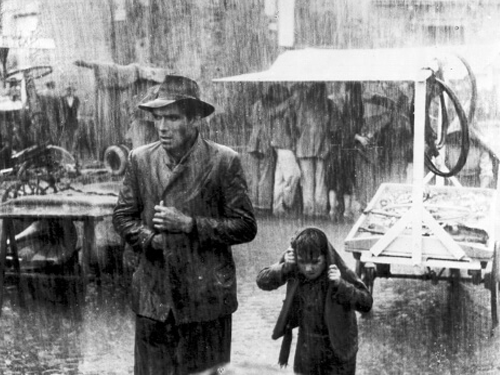
In post-war Italy, a working-class man’s bicycle is stolen, endangering his efforts to find work. He and his son set out to find it.
EN
“Bicycle Thieves is truly one of my favorite films. I could watch it over and over again, and in truth, I have. It’s a complicated and eloquent story in spite of its simple plot. The first time I saw Bicycle Thieves was in a class on neorealism, and I was immediately struck by how seamless and real it was, as if a camera were fortunate enough to be present in capturing an actual event. Bicycle Thieves gives meaning to the common man. And, as is often the case in life, reality here doesn’t have a happy resolution. It was the same where I grew up: life was basically a continuous struggle. You endure, as William Faulkner points out. The people from the housing projects near where I used to live had a lot in common with those in Bicycle Thieves. In trying to find answers to what I experienced, I read a lot of Depression-era literature and studied the works of the photojournalists who focused on families struggling to make ends meet – slave narratives and books like Richard Wright’s Native Son and James Agee’s Let Us Now Praise Famous Men, which share the sensibility that produced neorealism. To tell a story without imposing your values is very challenging.”
Charles Burnett1
“It was in this long overdue first viewing of Bicycle Thieves that I first recognized the often discussed link between Italian films of this era and contemporary Iranian films of today, and how such structural and thematic similarities in these films meld so seamlessly across what would appear to be such differing cultural divides. In watching Bicycle Thieves, for example, I noticed the sensitivity towards a child’s viewpoint, mirrored in many current Iranian films from Jafar Panahi’s The White Balloon and The Mirror to Kiarostami’s Where Is the Friend’s House? to Majid Majidi’s Children of Heaven. The setting of the film in the streets of Rome, was labyrinthine and chaotic, much like many depictions of Tehran today, making the connection between postwar Italy and contemporary Iran today more apparent than I had ever before realized.”
Joanne Kouyoumjian2

